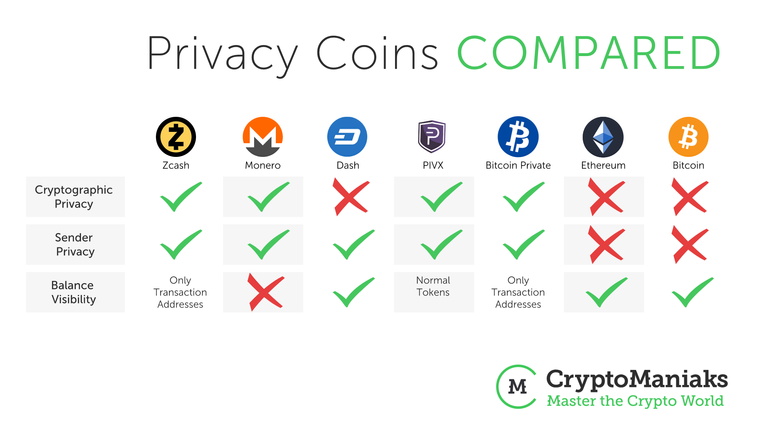
Since we are all undoubtedly spoilt for choice with more than 1700 listed cryptocurrencies on CoinMarketCap, a majority of aspiring disruptors have been specializing in a niche. One of these niches is cryptocurrency privacy. While most cryptocurrencies indeed work anonymously, transaction paths can be traced and there is no real privacy present. In fact, many cryptocurrencies are far from being considered as ‘privacy coins’.
What Makes a Fully Anonymous Privacy Coin?
Legitimate privacy coins are cryptocurrencies which allow users to make transactions without publicising any kind of information that could be traced to a person’s real-world identity.
There are various needs and demands for privacy coins, depending on the activity and the need for that activity.
Who Uses Privacy Coins and Why?
It’s time to get controversial. Bitcoin has been notoriously blasted for its heavy use towards illegal activities, specifically dark web related transactions. Having said that, there are many other reasons an individual may wish to have a degree of anonymity and privacy when transacting funds.
For instance, businesses of various natures often undergo lengthy and vigorous processes to ensure the privacy of data for reasons such as:
•Client privacy
•Policies and contractual obligations
•Personal matters
While these reasons are often overlooked and overshadowed by illegal activity, they are completely acceptable use cases. Furthermore, do we genuinely want our spending habits to constantly be exposed to private companies? We pay fees on transactions for facilitating the transactions, but they do not need to see what it is you are purchasing?
Allowing companies to be aware of our spending habits is simply foolish. In the age of information, the more data we give away, the more we are marketed to and the more our spending is influenced unwillingly. To summarize this point, we want to keep our activity as private as possible, especially from companies.
Secondly, there is a solid argument behind whether who should have full access to your purchase details, that including the product or service you are buying. Similar to the aforementioned point, as long as you are within the bounds of your local jurisdiction’s law, you will be thriving for privacy.
Hold that thought and see if you would be interested in using a privacy coin yourself.

Current Privacy Coins - Are They All Legitimate?
No, they are not. There are dozens of coins claiming to be both private and anonymous, but there are only a handful which are to be taken seriously. Coins like Verge have been subject to criticism for instance, but that’s a controversy for another day.
In this article, we are going to cover 5 privacy coins which are worth paying attention to; one of them being Bitcoin Private.
The Best Privacy Coins and How They Work
There certainly is not a factual ‘best’, but we have a good idea of which cryptocurrencies are the top choices to consider in 2018 as legitimate privacy coins. Let’s jump right in.
Our 5 chosen privacy coins are:
- Zcash
- Monero
- Dash
- Pivx
- Bitcoin Private
By using simple terminology, we will explain how each of these coins qualifies as a legitimate privacy coin safe with a high-degree of anonymous use.
ZCash
ZCash is the love-child of a few brainy founders, who in fact created a protocol named Zerocash, deriving from a not-so-popular coin named Zerocoin founded in 2013. Zerocoin founders included Christina Garman, Ian Miers, Aviel D. Rubin and Matthew Green.
ZCash’s privacy is thanks to the Zerocash protocol mentioned above. Part of this protocol involves zero-knowledge proofs, which is a secure way for one party to prove to another it’s statement is valid, without sharing any further information other than the statement’s true validity.
This sounds bizarre, after-all, how could a transaction be proven true by not having proof?
The spender of the funds essentially provides proof of expenditure by anonymous commitment, so the validity of the transaction is confirmed but the source of it remains unknown.
It is a project worth keeping an eye out for, especially for those rooting for a privacy coin to come out on top.Monero
Monero is a well established competitor who had a brilliant run in 2017 and has maintained its momentum. Monero is a fully decentralized cryptocurrency backed by a loyal community of users, many of which transitioned from using Bitcoin as regulars. Why?
Because of Monero’s high-standard of anonymity.
Monero’s transactions are approved by a fully distributed consensus model and are recorded on the blockchain unchangeably. By using stealth addresses, the system makes the origins of the transaction unclear, including:
•Locations
•Amounts
•Accounts
Furthermore, Monero stealth their transactions by using ring signatures. Ring signatures means anyone in a given group with keys has the authority to confirm a transaction, making it unrecognizable for an outsider to know who confirmed it.
Dash
Third up in the race for best privacy coin is Dash. As many crypto enthusiasts may already know, Dash coin was a fork of Bitcoin in the year 2014 and has re-branded twice since then (although Dash seems to have stuck).
What is Dash’s unique selling point?
The brains behind Dash have essentially created an improved version of Bitcoin, starting with a clever feature called ‘Quick Send’ and ‘Private Send’. Private Send allows users to send a coin in a manner where the system mixes the coins with others, in order to make the origins of that coin untraceable. Moreover, Dash runs masternodes which are charged with 1000 DASH as a minimum requirement, which help facilitate transactions in addition to the mixing service provided by Private Send and Quick Send.
Overall, Dash has a very sustainable and scalable system in place with a set 10% of mining rewards going directly to the Dash DAO exclusively for development purposes. Dash has been a reigning receiver of multiple complements as one of the top privacy coins available today.
PIVX
PIVX is a new-to-the-scene kid who gained some significant traction as one of the best privacy coins in the industry in 2018. PIVX, originally named ‘Darknet’, was founded in 2016. The name is certainly not misleading as the project is marketed be exclusively aiming at the privacy market.
Except for working on a Proof-of-Stake model as opposed to Proof-of-Work, PIVX is very similar to Dash. PIVX confirms transactions by running nodes of a sort which must constantly be charged with a set balance or collateral of at least 10,000 tokens.
These nodes are called masternodes and their functions which are superior to a normal node include:
•Coin mixing resulting in transactional privacy
•Custom budgeting system - fully distributed
•Immutable voting system
•Instant transactions
PIVX is known to have extremely fast transfer as well as verification speeds, with the ability make transactions completely unanimously. This way, the user’s identity does not have to be disclosed as a result of PIVX’s dissection of the blockchain.
This project is still fairly new compared to it’s aforementioned competitors, but by all means should not be discredited.
Bitcoin Private
Here we have another fork of Bitcoin in the form of Bitcoin Private. They are completely community driven with over 150 contributors worldwide, aiming to create a platform for anonymous trading in the best light.
Bitcoin Private was launched in March 2018 with the hard fork snapshot date taking place in February 2017. The protocol behind this privacy coin is essentially the combination of Bitcoin and ZClassic, using the Zerocash protocol described earlier in this article.
The Bitcoin Private network runs on a Proof-of-Work protocol named Equihash and is aimed to be available for commercial use in the coming years, should it all go to plan. But can an anonymous privacy coin have large appeal in the mainstream market as early as 2020? Maybe.
Comparison of Our Top 5 Privacy Coins
Without going into too much technical detail, let’s compare our top 5 best privacy coins alongside giants like Ethereum and Bitcoin, to give you a better idea of what is or is not public.
The factors we will be considering are:
•Cryptographic privacy - Whether the cryptographic data of the transactions is publicly visible, regardless of encryption capability.
•Sender privacy - The privacy of the sender, in any form, protected both from the blockchain and the recipient.
•Visibility of balances - The ability to see the balance of either the sender, the receiver or the transaction block
Here are our top 5 side-by-side along with Bitcoin and Ethereum for comparative perspective:

Benefits of Privacy Coins and Recognizing Fake Privacy Coins
There are countless benefits for using privacy coins, whether you are looking to buy a secret gift for a loved one, or sealing a business transaction where a certain party is heavily reliant on the privacy of a certain dataset.
Whatever it is you are looking to use a privacy coin for, ensure that you are aware of which piece of data you absolutely need to be anonymized. Seeing as there are a variety of coins out there which will do the job, this is a key step. Furthermore, you can actually select settings in some of these coins wallet to essentially adjust degrees or privacy.
Similarly, do your research on coins which advertise themselves as ‘anonymous’ and ‘private,’ but do not match the above criteria. While someday that coin was considered to be highly secure and anonymous to use, the times may have changed. In short, the future of a privacy coin can’t be easily predicted. Ensure that the technical specification for your suspected coin either matches or mentions the degree of privacy they provide.
Conclusively, there are approximately 20-25 coins out there today which are considered qualifying contenders as privacy coins, including our top 5. Some other notable coins worth checking out are: Komodo, Particl, Phore and Zoin.
If you have concerns about personal privacy, then feel free to get started with the coins mentioned here or search for more options at our coin reviews section.
We wrote an blog post about our top 5 pick for 2019 and one of this privacy coin has been selected, can you guess which one it is ?
Check it out in our blog post :
https://cryptomaniaks.com/latest-cryptocurrency-news/investing/2018-Cryptocurrency-Wrap-Up-Our-Top-5-Favorite-Projects
Nice write up, but to me it seems you are yet to Learn about VEIL coin, it's a hybrid privacy coin which utilizes the technology behind zcoin an monero